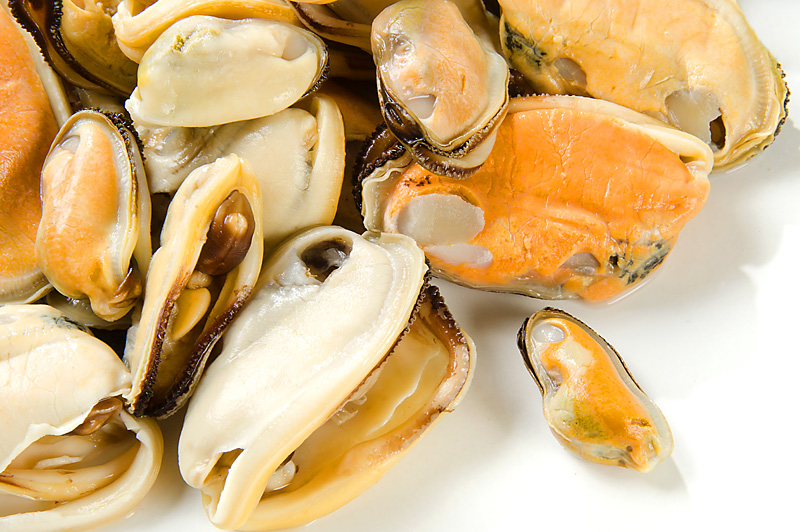The benefits of mussels for health
Mussels are mollusks in the Mytilidae family and an important source of food worldwide. They can live in both freshwater and saltwater and feed by filtering water and retaining the nutrients from it. As a food, mussels are a rich source of B vitamins, particularly vitamin B12 and provide important amounts of protein and dietary minerals. They are a great food for muscle building, brain and nervous system health, combat brain fog and fatigue, boost energy levels, improve mood, regulate sleep and contribute to better bone density.

Mussels look like black clams, but more elongated and narrower, like the shape of a potato wedge. They have a smooth shell with a concentric line pattern and, like all bivalve mollusks, they are joined by a ligament at one edge. Mussel shells have smooth edges, unlike oysters which can have sharp edges. Although most mussels appear black, a closer look at their shell reveals they can be black, dark blue, dark purple or dark green infused with brown and green. For example, The Atlantic blue mussel (Mytilus edulis) appears black but is actually dark blue or purplish-black with occasional brown traces of color. The shell of the Asian green mussel (Perna viridis) is bright green with brown in younger specimens, while older ones are dark green with brown.
Taste qualities of mussels
Raw vs. cooked mussels and farmed vs. wild-caught mussels taste. Unlike other mollusks like clams, oysters or scallops, mussels are generally eaten cooked, not raw. Also, wild-caught mussels tend to have more flavor than mussels from aquaculture.
This being said, if fresh and cooked right, mussels should taste good. Cooked mussels are more tender than clams and less mushy than raw oysters. They are soft, tender and light-tasting, with no overpowering briny or fishy flavors. Most mussels have a delicate sweetness to them and pleasant ocean flavors. At most, they are as fishy-tasting as crab meat. The texture is slightly chewy, but nevertheless tender, similar to mushrooms.
They can be boiled, steamed, smoked, roasted or fried. Mussels go great with butter, lemon juice, white wine, cider, garlic and tomato sauces, various spices and herbs like chili peppers, ground pepper or parsley. Some people like plain steamed mussels recipes. They can also be made into broth, paired with rice, pasta or other seafood like shrimp, crab or clams.

Health benefits of mussels
Eating cooked mussels can provide the following benefits and nutrients:
1) Rich in protein. Eating mussels provides excellent amounts of protein to your diet: 12-23 g of protein/ 100 g. Protein plays vital roles within the human body, helping build and repair muscle, boost immunity by helping produce antibodies and synthesize neurotransmitters in the brain that regulate mood, appetite and sleep. Eating enough protein helps clear thinking and combat brain fog.
2)Vitamin B12 content:
– 100 g of raw, blue mussels provide 12 micrograms of vitamin B12
– 100 g of cooked (moist heat), blue mussels provide 24 micrograms of vitamin B12
The current recommended daily intake is 2.4 micrograms of vitamin B12.
In other words, eating only 100 g of cooked blue mussels can supply diet with 10 times vitamin B12 RDA. Vitamin B12 helps prevent anemia and preserves the myelin sheath protecting the tail of nerve cells, preventing nerve damage that could result over time in the onset of dementia, Alzheimer’s disease, multiple sclerosis and other degenerative conditions of the nervous system. Vitamin B12 is involved in energy metabolism and an adequate intake helps boost energy levels, combat physical and mental fatigue.

3) Excellent source of B vitamins overall. Mussels are rich in other B vitamins as well: thiamin, riboflavin, niacin, vitamin B6 and folate. In addition to elevated energy levels, B vitamins benefit digestion, nutrient absorption and brain health. Folate and vitamin B12 both help prevent neural tube defects of the brain, spine and spinal cord in newborns.
4) Good source of phosphorus, potassium and sodium. Mussels provide the following nutrients (estimated):
– phosphorus: 200-280 mg/100 g
– potassium: 270-320 mg/ 100 g
– sodium: 280-370 mg/100 g
These are good amounts (around 10% of the current RDI) of essential nutrients that promote good bone density, strong bones and teeth and regulate blood pressure. Sodium too is needed for maintaining an optimal blood pressure level, regulating blood volume and other benefits. Other minerals in mussels include small amounts of calcium, iron, magnesium and zinc.